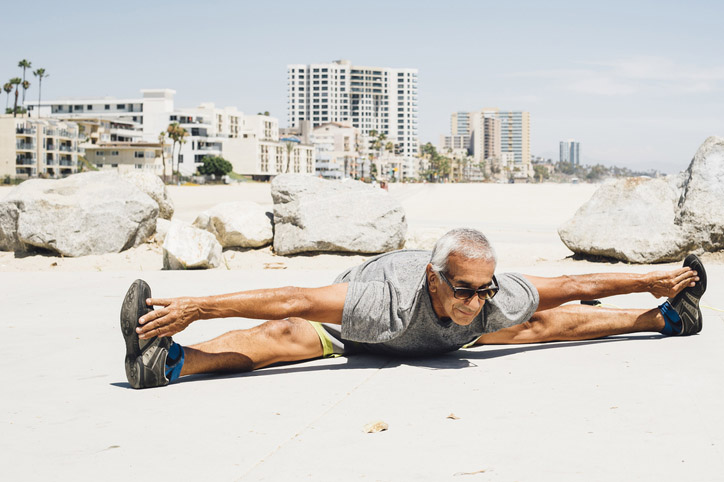It’s happened to the best of us. We count down to vacation, in the most robust of health, thinking we’re ready to eat, drink, and be merry in the most excessive fashion. We plan our dinner reservations in advance, poring over the menu ready to consume its most decadent options, look forward to sipping on cocktails under sunny skies, waist-deep in cool pool water, and maybe finally finishing a (fun) book this year.
… But your stomach may have other ideas. An unexpected creak, a gurgle, a cramp … These are all signs of a rebellion in wait, and your gut can no longer be trusted.
How do you reduce your chances of gastro upset, though? And how can you tell if you’re sick-sick – with a bug or food poisoning – or you’ve just overdone it?
Well, since we didn’t know the answer, we figured it was the perfect thing to Ask a Pro about. We spoke with Dr. Andrew Boxer, gastroenterologist at Gastroenterology Associates of New Jersey, to learn how much tummy trouble constituted a stomach problem and how to avoid aggravating your gut when traveling.
Identifying Your Stomach’s Upset
Is It Food Poisoning?
First things first, don’t assume the worst. Whether at home or away, many people’s minds will fearfully jump immediately to food poisoning, when in reality, it could just be a simple stomachache, brought on from overindulgence or simply eating something your digestive system decided it didn’t agree with.
Despite what some people may think, the effects of food poisoning aren’t instant. “It can set in within hours; it might even take up to a day,” Dr. Boxer says. “The patient will have diarrhea, abdominal pain, nausea, and will vomit. You might also have a fever.”
With a basic upset stomach, “There should be less nausea, vomiting, and pain,” he says, and it is more immediate than food poisoning.
Is it the Stomach Bug?
The stomach flu is also known as a few other things: norovirus, rotavirus, adenovirus, and astrovirus. Diarrhea is the main symptom of any stomach bug, and nausea, vomiting, cramps, fever, headaches, and dizzy spells usually also present alongside it.
These all have different incubation periods, with impacts that last roughly three days (norovirus, the ost common of the set) to up to two weeks (adenovirus, which has an incubation period of up to ten whole days before symptoms appear). However, they are all viral and passed through close contact with the germ, including through food touched with bare hands, which make it highly contagious, and definitely something you should seek out the on-staff or on-site medic at your resort – a common amenity at higher end all-inclusive resorts – or on your cruise ship. While medical services are never included and will incur an additional fee, Dr. Boxer says, “If something [doesn’t] feel right, you should see a medical professional even if it’s an extra charge. Infectious diarrhea can get bad quick[ly]. Once the body’s reserve is used up, a patient can get very sick very fast.”
Is it “Montezuma’s Revenge?”
“’Montezuma’s Revenge’ is a term given to diarrhea illness after drinking water with bacteria or a virus in it,” the doctor explains. Unfortunately, he says, “There’s no way to differentiate this from food poisoning.”
“When treating this, I lump food and water together for infectious diarrhea. I always recommend drinking unopened bottled water when traveling, and to avoid using ice in your drinks, as this can be made with water with bacteria,” advises Boxer.
Other ways to avoid potential contamination is to make sure all raw fruits and vegetables, including those in salad, are washed with purified filtered water and not local tap water. This is often the case at quality all-inclusive resorts who cater to American customers, like the properties sold through ALG Vacations®. At hotels and resorts like that, most of the water lines are run through a powerful filtration system, and many eco-friendly brands have excellent water conservation programs with rigorous purity standards. Water from the taps, dispensers, and in the kitchens are all treated for vacationer safety, and may even be of higher quality than at home! Because of this, it is generally safe to brush your teeth and wash your face in your bathroom, as well, which helps reduce waste in single-use plastic.
However, it’s always a good idea to check, and when you Plan with a Pro, you can Ask a Travel Advisor if that resort’s water is fully free and clear.
What About Constipation?
On the other end of the spectrum, some people lose the ability to “go” when they go. “This is actually very common with travel,” Boxer assures us. “It happens due to change in our diet, sleep, activity level, and bathroom access.”
Don’t fret too much about this. If you know you’re prone to this condition while away, pack a few gentle laxatives, eat all the fresh veggies that are always on offer at food-focused all-inclusive resorts, and hydrate, hydrate!
Speaking of Hydration …
Tips for Drinking
And we don’t mean the ones you (don’t have to, at an all-inclusive resort!) leave in a jar at the bar!
Staying well-hydrated is an incredibly important part of enjoying yourself – and your stomach! – while away on vacation. Unfortunately, alcohol doesn’t quite count. Spirits, liquors, liqueurs, beer, wine … sadly, as liquid as they are, they’re actually dehydrating.
Boxer breaks the bad news: “There is no way to drink alcohol that will reduce risk of dehydration. Alcohol inhibits a natural body hormone, an antidiuretic hormone, and will cause dehydration.”
The good news, though, is that he does have some tips on how to drink safely in the sun. “Make sure you are drinking water or sports drinks between alcohol[ic ones]. The sun is very dehydrating, and you may not feel that and the alcohol setting in. I recommend drinking and finishing a non-alcoholic drink in between each one.”
Also, make sure to wear sunscreen if you’re living your best day-drinking life. “Patients can get worse sunburn,” he cautions!
But if you’re more worried about your upset stomach than your angry skin, he recommends an oral rehydration solution if you’ve got symptoms of any of the tummy troubles mentioned before. “Certain infectious diarrhea illnesses can be dangerous due to toxins affecting different organ systems, but for the most part, these illnesses are most dangerous because they cause dehydration.”
Packing individual packets of electrolyte-rich solution to enhance your water with is a good call on any trip. They don’t take up much room in your bag or purse and can help your body hold onto that precious liquid more than plain water. Liquid I.V. is a popular and accessible brand, but personally, I love the flavors and profiles of ROAR Plus, which includes antioxidants and immunity boosters like zinc and elderberry as it turns your H2O into Berry Lemonade and Strawberry Watermelon drinks.
We all know how important it is to Plan with a Pro when it comes to travel. After all, Travel Advisors Get You There. But equally important is making sure advisor pros are supported and surrounded by pros themselves, particularly when it comes to topics peripheral to travel. That’s where TravelBlogue comes in as we Ask a Pro on your behalf to provide you with tips and advice from fitness, health, nutrition, mental health, beauty, wellness, and travel gear experts from around the world … and put it all at advisor fingertips.







